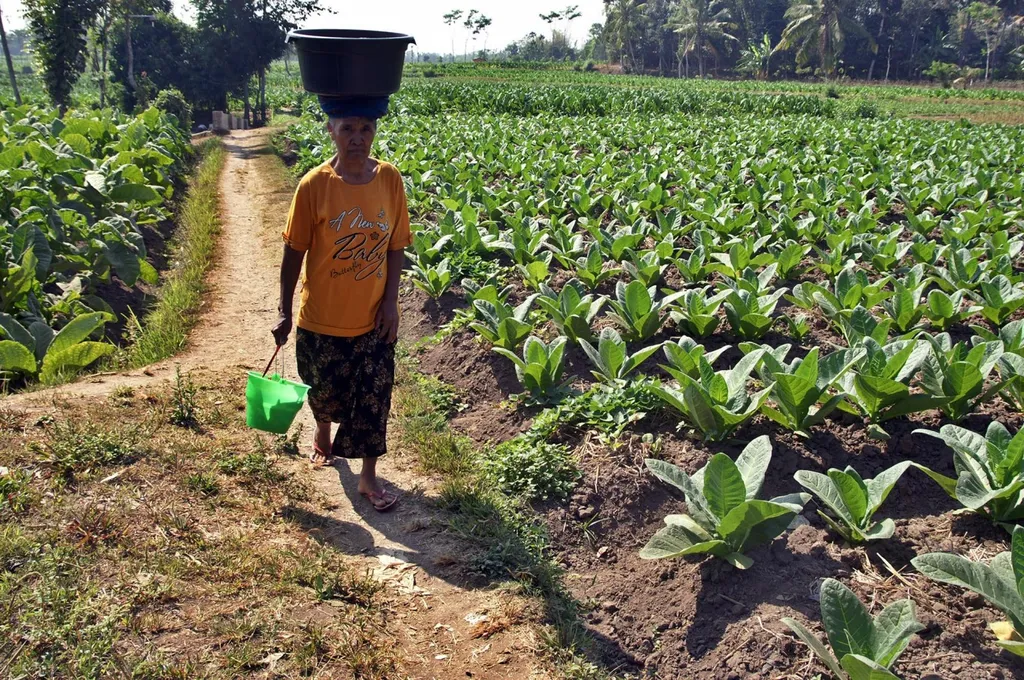In the heart of Indonesia’s tobacco-growing regions, a technological revolution is brewing, promising to transform the way farmers cultivate one of the country’s most valuable crops. A team of researchers, led by Putri Liana from Politeknik Elektronika Negeri Surabaya, has developed an innovative Internet of Things (IoT)-based drip irrigation system that leverages fuzzy logic to optimize water usage and streamline the irrigation process. This cutting-edge technology, detailed in a recent study published in the CommIT Journal, could have significant commercial impacts for the agriculture sector, both in Indonesia and beyond.
Tobacco cultivation in Indonesia, primarily conducted during the dry season, has long grappled with challenges such as water scarcity and labor-intensive irrigation methods. The newly developed IoT-based drip irrigation system addresses these issues head-on by integrating a suite of sensors—including a DHT11 temperature sensor, a soil moisture sensor, and a soil pH sensor—to monitor environmental conditions in real-time. An Arduino Uno and an ESP8266 microcontroller process this data and transmit it to Firebase, enabling farmers to make informed decisions about irrigation.
The system’s standout feature is its application of the Mamdani fuzzy logic method, which determines the optimal irrigation duration based on temperature and soil moisture readings. “This approach allows the system to mimic human decision-making processes, adapting to the unique conditions of each tobacco field,” explains Liana. The results are impressive: the system reduces water usage by up to 36.67% compared to conventional manual watering methods, with an average water consumption of just 297.32 mL per automated irrigation cycle.
The accuracy of the system is equally noteworthy, with an average deviation of only 0.33 between the fuzzy logic results generated by the Arduino Uno and MATLAB simulations. This high level of precision not only conserves water but also ensures that tobacco crops receive the exact amount of moisture they need to thrive. “The system’s ability to provide real-time monitoring and automated irrigation is a game-changer for tobacco farmers,” says Liana. “It simplifies the irrigation process, reduces labor costs, and promotes sustainable water management.”
The commercial implications of this research are vast. For tobacco farmers, the IoT-based drip irrigation system offers a cost-effective and efficient solution to the challenges of dry-season cultivation. By reducing water usage and labor requirements, the system can significantly lower production costs, enhancing the profitability of tobacco farming. Moreover, the technology’s precision and adaptability make it a valuable tool for promoting sustainable agriculture practices, which are increasingly important in the face of climate change and resource scarcity.
Beyond the tobacco industry, the research holds promise for other sectors of the agriculture industry. The integration of IoT and fuzzy logic in irrigation systems represents a significant step forward in precision agriculture, a field that aims to optimize crop yields while minimizing resource use. As such, the technology developed by Liana and her team could serve as a model for similar systems in other crops, contributing to a more sustainable and efficient global agriculture industry.
The study’s findings also highlight the potential for further innovation in the field of agricultural technology. As IoT devices become more sophisticated and affordable, and as fuzzy logic algorithms continue to evolve, the possibilities for precision agriculture are virtually limitless. Future research could explore the integration of additional sensors and data sources, as well as the development of more advanced decision-making algorithms, to further enhance the capabilities of IoT-based irrigation systems.
In conclusion, the IoT-based drip irrigation system developed by Putri Liana and her team represents a significant advancement in agricultural technology. By combining the power of IoT and fuzzy logic, the system offers a innovative solution to the challenges of tobacco cultivation in Indonesia, with far-reaching implications for the global agriculture industry. As the world grapples with the challenges of climate change and resource scarcity, technologies like this one will be increasingly important in promoting sustainable and efficient agricultural practices.

